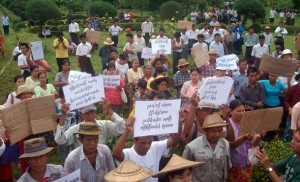Defending Human Rights Still a Risky Business in Burma
By Burma Partnership • September 10, 2012 Last week former political prisoner Wai Lu, who was helping protesting farmers win back land confiscated by a copper mining company in the Latpadaung mountain range, was taken off a bus and arrested on his way back to Rangoon. Family members have been told he is being charged under Burma’s Religious Offenses Act, yet they haven’t had a chance to see him since his arrest and don’t know where he is being held.
Last week former political prisoner Wai Lu, who was helping protesting farmers win back land confiscated by a copper mining company in the Latpadaung mountain range, was taken off a bus and arrested on his way back to Rangoon. Family members have been told he is being charged under Burma’s Religious Offenses Act, yet they haven’t had a chance to see him since his arrest and don’t know where he is being held.
Wai Lu is not an isolated case. In the last two months, human rights defenders have been arbitrarily arrested for defending people’s freedom of assembly and for participating in protests. On 7 August, police in Mandalay detained labor activist Aye Thein after he represented vendors protesting against their relocation. In early July, the government harassed and detained student activists in order to prevent them from holding commemorations of the 50th anniversary of the military regime’s crackdown on students. In May, the Police arrested and intimidated more than 40 protesters who took part in the nationwide peaceful candlelight protest for electricity. Naw Ohn Hla, a former political prisoner, claims the authorities continue to spy on her since she led these protests.
When participating in a protest people face the risk of not only arrest but also prosecution. On 23 August, the President of the Peace and Diversity Party, Nay Myo Wai was summoned to appear in court to answer defamation charges after he accused the Zay Kabar Company of illegal land confiscations and farmers in Meikhtila District, Mandalay Division, who continued to work their confiscated land were charged with trespassing.
Despite the adoption of the Peaceful Demonstration and Gathering Law, the government still severely restricts and tightly controls people’s right to assembly. On 19 July, for Martyr’s Day commemoration government authorities in Pegu Division, Ye Township in Mon State and Lashio in Northern Shan State barred local NLD members from assembling. On 21 August, authorities in Rangoon denied permission to a group of journalists to protest and on 2 August farmers were denied a permit to demonstrate against the confiscation of their land in Labutta Township in the Irrawaddy Region. On 23 August, a human rights training program organized by the NLD was forced to close by the Yay Nan Chaung Election Commission in upper Burma.
This week, the European Union is starting to draft the United Nations General Assembly Resolution on the situation of human rights in Burma. Last year the UNGA “strongly call[ed] upon the Government of Myanmar to lift restrictions on the freedom of assembly, association and movement and the freedom of expression […].” United Nations Members States must realize that these restrictions are still in place.
To ensure that Wai Lu and other human rights defenders who continue to put themselves at risk for Burma to change for the best and not for the worst, the UNGA resolution must strongly urge the government of Burma to review without delay all legislation, including the 2008 Constitution, with a view to amend or repeal those not consistent with international human rights standards and laws and, pending such a review, refrain from using these laws to restrict fundamental freedoms.
The UNGA Member States must also express deep concern at the continuing reports of restrictions on fundamental freedoms of former political prisoners, democracy activists recently returned from exile, and human rights defenders. Member States must strongly call upon the government of Burma to cease and refrain from all forms of harassment or intimidation and to commit to fully protect their human rights, including their right to vote and stand for elections, to participate in public life, to freedom of movement, expression, association, assembly, and to defend human rights individually and in association with others.
Tags: Burma Partnership, Human Rights, Land Confiscation, ProtestThis post is in: Blog
Related PostsBurma Partnership Celebrates Continuing Regional Solidarity for Burma and Embraces the Work Ahead for Progressive Voice
Burma Army Displays Blatant Disregard for 21st Century Panglong Peace Process
Ann Din Coal Power Plant: Local Movement and Action to Preserve and Protect Natural Resources and Land: Mon IDP Report Case Study #4
Latest Human Rights Abuse Case Demonstrates Urgent Need to Reform the Myanmar National Human Rights Commission
Human Rights Far From Guaranteed as US Sanctions on Burma Are Removed









 All posts
All posts